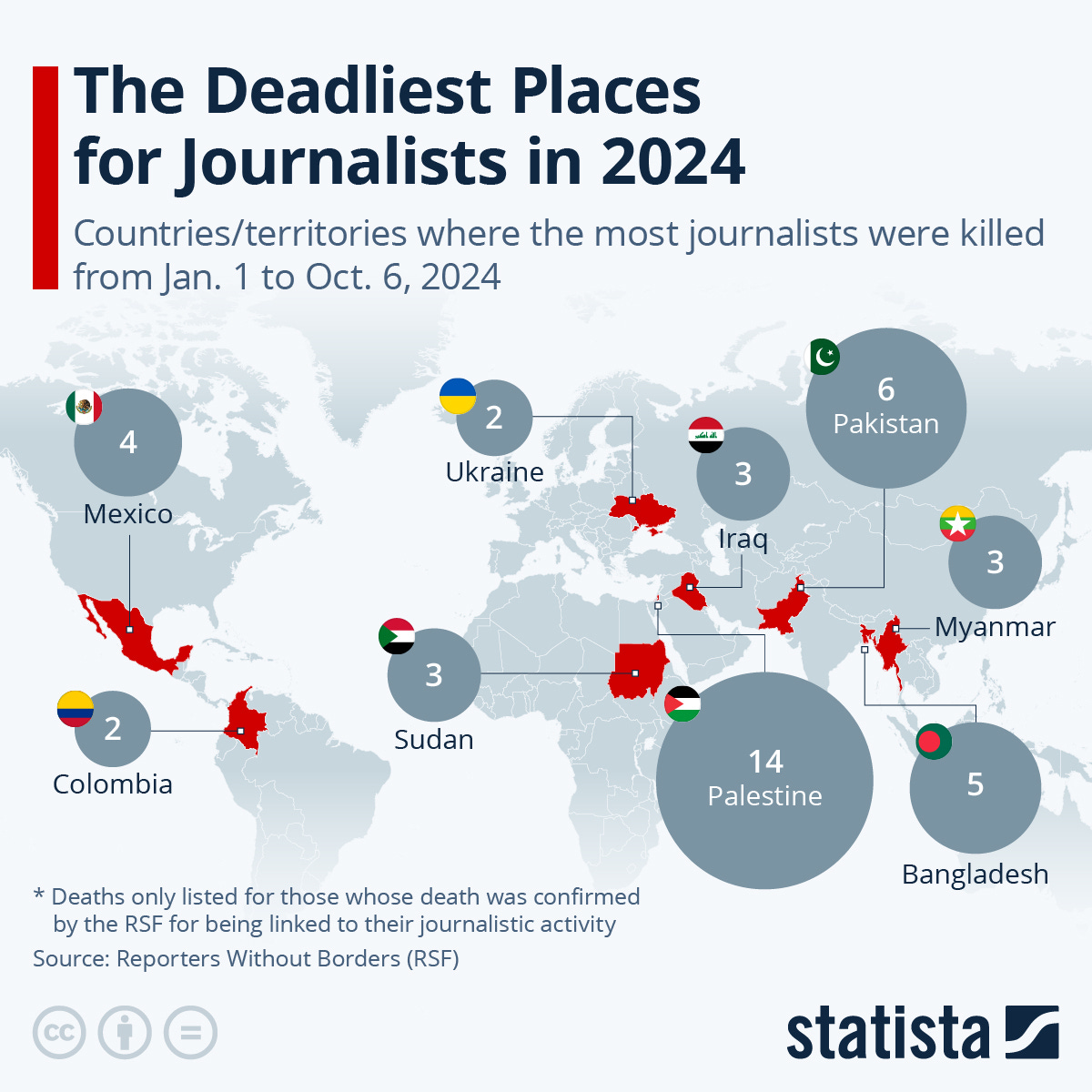This week…
Your reading time is about 5 minutes. Let’s start.

Helena Kudiabor wrote in Nature about a study published in Science Advances that revealed three ways one disappears down a Wikipedia rabbit hole. Sadly, being referred to a Wikipedia page by TSB is not one of these ways. Regardless, are you a ‘hunter’ who pursues specific answers, the ‘busybody’ who searches for diverse nuggets of new information, or the ‘dancer’ who links unrelated concepts through the process of exploration?
Your Wikipedia this week: Context collapse
And now, a selection of top stories on my radar, a few personal recommendations, and the chart of the week.
ICYMI: The Previous Block was about media freedom and tech on steroids. FWIW:
Finding revenue, repelling attacks and protecting sources: How these editors manage their newsrooms from exile by Gretel Kahn for RI.
CORRECTION NOTICE: None notified.ON THE MEDIA
Journalist who exposed Cambodia’s scam industry released by authorities
Rebecca Ratcliffe for The Guardian:
Mech Dara, one of Cambodia’s most prominent journalists, known for exposing the country’s billion-dollar scam industry, has been released on bail after a video of him apologising to the country’s leaders appeared in pro-government media.
Dara was arrested last month while travelling with his family, and charged with incitement over social media posts.
On Wednesday a government-friendly site published a video of Dara, wearing a prison uniform, apologising and asking for forgiveness for various social media posts. He had been held in a cramped cell with more than a hundred inmates for more than three weeks.
“In all the messages that I posted, I conveyed false information that affected the leaders and the country’s reputation. I sincerely apologise for my mistakes and promise to stop sharing such harmful content,” Dara said in the video.
He could still face up to two years in prison on the charges, which have been widely condemned by press freedom and human rights advocates. Dara said after his release that he would take a break from journalism while he fought the charges against him.
The arrest was a serious blow to the country’s independent media, which has faced years of attacks aimed at shutting down any scrutiny of leadership in the country, which is in effect a one-party state.
Loosely linked:
The declining freedoms of speech and press in Indonesia by Sofie Syarief for Fulcrum.
Mexicans have code words to report on narco-violence without getting banned by moderation policies by Daniela Dib for Rest of World.
Inside Syria’s YouTube scene by Nour Idriss for New Lines Magazine.
Kenyan lawyer Mercy Mutemi takes on Meta and ChatGPT by Isobel Cockerell for Coda.
Controversy after Polish radio station replaces human presenters with AI by Daniel Tilles for Notes from Poland.
Meta strikes multi-year AI deal with Reuters by Sara Fischer for Axios.
ON THE INTERNET
I’m not stupid, I’ve chosen to speak, says catfish victim duped for nine years
Amber Sandhu and Manish Pandey for BBC:
Kirat Assi, who is from a Punjabi background, says speaking out was important because she wanted to challenge stigmas in the South Asian community.
“We are so scared to open up about these issues,” she says.
“Because of how a community will be seen by wider society, the victims in our communities keep suffering.”
Kirat says her dad’s reaction to her story is a good example of what she means.
“He doesn’t want to know what happened,” she says.
“Because to face up to what happened, and how horrific it was, it’s going to be painful.
“I love my dad and I know my dad loves me,” she says, adding: “It’s a different set of values that he has been brought up with.”
Kirat says she hasn’t spoken directly to “the real Bobby” about what happened, and puts this down to the community’s reluctance to have difficult conversations.
She wonders if her experience would have been the same if she'd come from another background.
You’ve probably watched Sweet Bobby recently. I did too. I’m most impressed by the discussion around cultural context within this entire catfishing saga. Loosely linked:
A man who abused up to 3,500 girls online jailed for a minimum of 20 years by Fiona Murray and Cormac Campbell for BBC.
Fanatical: The Catfishing of Tegan and Sara is a timely study of stan and scam culture by Linsday Lee Wallace for Time.
What are digital arrests, the newest online scam used by cybercriminals? by Dwayne Oxford for Al Jazeera.
ON SCIENCE
Reading your mind: The future of brain privacy
Avi Asher-Schapiro for Context:
Brain-reading devices anyone can buy on the internet can decipher your moods, your focus, and in the not so distant future, maybe even the words you are thinking.
And they are loosely regulated, if at all.
Such advances carry incredible promise for medicine, wellness, and consumer electronics. But they could also usher in a dystopian future where our thoughts are no longer our own.
In recent years, a growing group of scientists, lawyers, and ethicists have been trying to come up with a legal framework to steer these innovations in a way that respects fundamental human rights.
Loosely linked:
Why your brain could be the next frontier of data privacy by Sheena Goodyear for CBC.
The brain collector: the scientist unravelling the mysteries of grey matter by Kermitt Pattison for The Guardian.
A scientific fraud. An investigation. A lab in recovery. by Kalli McMurray for The Transmitter.
Google Scholar is not broken (yet), but there are alternatives by Kirsten Elliott for LSE.
A new ‘race science’ network is linked to a history of eugenics that never fully left academia by Lars Cornelissen (Independent Social Research Foundation) for The Conversation.
Other curious links, including en español et français
INTERACTIVE LONG READ | Race Science Inc.: Undercover in The Human Diversity Foundation, the million-dollar race science company by Harry Shukman and Patrick Hermansson for Hope Not Hate.
INFOGRAPHIC | An explainer for ranked-choice voting by Travis Hartman and Tiana McGee for Reuters.
PHOTO ESSAY | Public university protests escalate in challenge to Argentina’s President Milei by Isabel Debre for AP.
El fin de los árbitros. ¿Hasta dónde puede llegar la IA en el deporte? por Fernando Maldonado en Retina.
Un bulo en el telegram de Alvise Pérez y un neonazi en los medios por Diego Delgado en CTXT.
Los daños de la IA: suicidio, aprovechar la muerte de extraños, crear ‘deepfakes’ pornográficos y productos defectuosos por Raúl Limón en El País.
Au procès des viols de Mazan, la volonté et la détermination de Gisèle Pelicot : « C’est à eux d’avoir honte » par Céline Rastello dans Le Nouvel Obs.
Sky ECC : une messagerie canadienne prisée des criminels par Frédéric Zalac et Paul Émile d’Entremont dans Radio-Canada.
Chercher un travail sur LinkedIn peut finir par un piratage de tous vos comptes par Bogdan Bodnar dans Numerama.
What I read, listen, and watch
I’m reading Literary Theory for Robots (2024) by Dennis Yi Tenen. A little bit funny and a lot of context Tenen explains how computers learned to write. (This one-line summary lacks nuance.)
I’m listening to The Guardian’s Full Story podcast about how some of the wealthiest and most powerful people see race in Harry Shukman’s undercover expose about a scientific racism network.
I’m watching an explainer on why subscriptions are everywhere and you do not own anything you have bought by More Perfect Union.
Chart of the week
Statista’s Anna Fleck mapped the deadliest places for journalists in 2024 based on the Reporters Without Borders (RSF) database. “By far the deadliest place for journalists last year was in the Palestinian territories, where 14 deaths have already been counted in the first ten months of the year. Following some way behind are Pakistan with six deaths currently reported there, five in Bangladesh, four in Mexico, three in each of Sudan, Myanmar and Iraq, as well as two deaths in Ukraine and Colombia, respectively.”




